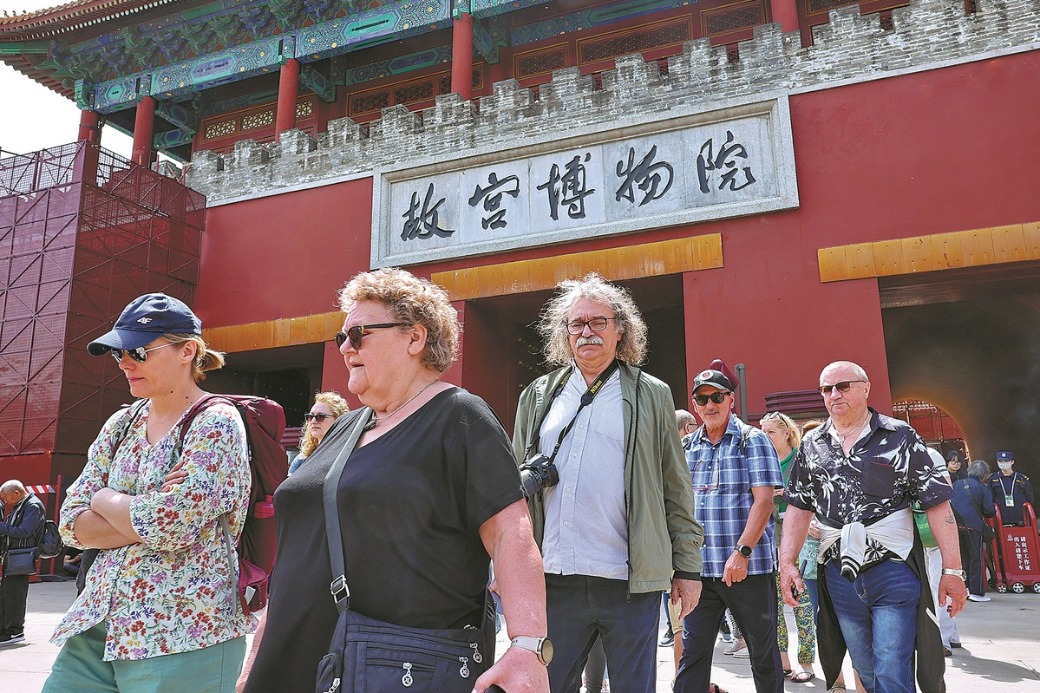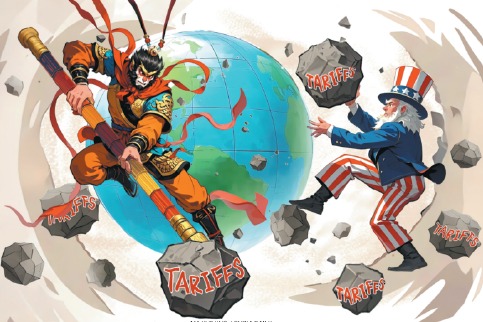Emotional economy no passing fad


In an age of material abundance, a quiet consumer revolution is reshaping the shopping carts of China's younger generations. The rise of bizarrely popular items — from viral green plants named "ban banana greenness" ("banana green" sounds like "anxiety" in Chinese, a reminder to stay calm and not overthink) to "a bag of garbage" (a novelty stress relief toy), from the blind box craze to the widespread demand for dazi (a casual friendship offering scenario-based companionship, such as meal or studying) — signals a deeper trend: the steady ascent of the emotional economy. As utilitarian consumption gives way to emotional experience, a transformation driven by feelings is redefining the foundations of China's consumer market.
Traditionally, price-performance and utility defined the worth of a product. But for today's young consumers, shopping is no longer merely transactional — it's existential. Buying is as much about "who I am" as "what I need".
T-shirts emblazoned with the "lying flat" slogan, quirky "ugly-cute" cultural products, and merchandise tied to virtual idols offer little practical function but immense emotional resonance. These objects speak not to utility, but to identity, validation and relief.
The late sociologist Zygmunt Bauman's theory of liquid modernity helps explain this shift. In a society where traditional social bonds are eroding and life feels increasingly unstable, people seek lightweight emotional anchors. Objects such as blind boxes or stress-relief toys become affordable emotional surrogates — providing not only distraction, but a fleeting sense of control in an uncertain world. Even the humble Ban Banana Greenness plant, by playing on a pun, becomes an emotional talisman more than a botanical specimen.
In essence, emotional consumption marks a shift from owning to feeling. Young people are using consumer behavior to craft a personal emotional vocabulary.
Two key trends are shaping the emotional economy's frontier: healing consumption and function-based socializing, often dubbed social dazi.
The healing consumption provides direct emotional healing through goods and services, creating a controllable and predictable emotional haven for consumers. For example, immersive experience centers create virtual emotional scenes through technological means, allowing consumers to briefly escape from reality; The healing space utilizes techniques such as aromatherapy and sound therapy to provide a solution for physical and mental relaxation.
The rise of social dazi reflects the digitization of companionship. In contrast to traditional relationships, these connections are modular and purpose-driven: movie dazi, gym dazi, or dinner dazi. Think of them as plug-and-play social units — low-stakes, goal-oriented, and emotionally bounded.
While these trends differ in form, they share a common function: converting emotional needs into marketable experiences.
At its core, emotional consumption relies on the creation and transmission of symbols. Consider anime merchandise: a metal pin bearing a beloved character can sell hundreds of thousands of units — not because of the pin itself, but because of the emotional projection it enables. Museum gift shops, once stuffy and niche, now sell artifacts that let young people wear their cultural identity with playful pride.
On the other side, the emotional economy is driving cross-sector convergence. As feelings become a currency, industries from art and tech to mental health are fusing into new hybrids. Creative industries are developing emotionally intelligent digital art; mental wellness startups are launching AI-powered emotion trackers.
Still, the commercialization of emotion is not without peril. When emotional needs are overly packaged and monetized, there is a risk of alienation — of replacing real connection with consumer proxies.
Emotionally charged consumption reflects the profound cultural and psychological undercurrents in modern Chinese society. As products become symbols and experiences replace ownership, the consumer landscape is morphing into something far more personal, and far more symbolic.
This is a deep reflection of China's consumption upgrading — when material abundance meets emotional awakening, consumption is no longer a simple transactional behavior, but has become a medium for individuals to communicate with the world. Navigating this terrain will require balancing commercial innovation with human sensitivity. After all, the most powerful economies are not just built on capital — but on connection.
The author is an associate researcher at the Institute of Finance and Banking, Chinese Academy of Social Sciences. The views don't necessarily reflect those of China Daily.
If you have a specific expertise, or would like to share your thought about our stories, then send us your writings at opinion@chinadaily.com.cn, and comment@chinadaily.com.cn.
































